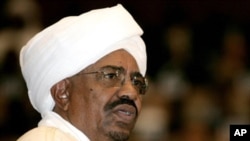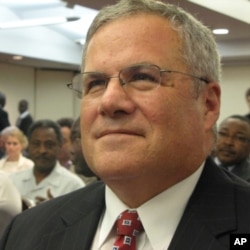A prominent member of Sudan’s dominant National Congress Party (NCP) said President Omar Hassan al-Bashir’s government believes it is time Khartoum and Washington normalize diplomatic relations.
The U.S. Embassy in Sudan has had no ambassador since 1998.
Professor Ibrahim Ghandour, a former vice chancellor of the University of Khartoum, said President Bashir’s government enjoys tremendous support from the Sudanese people following his recent electoral victory.
He said that positions the administration to be a partner for U.S. interests across Africa.
“Sudan remains an important country, whether it remains united or separated," he said. "The area Sudan is having in North and Central Africa [and] between East and West Africa is a very important area for the United States policies in Africa, [and] for the America interest in Africa. Normalization of the U.S. and the Sudanese relations [are] very important for both sides.”
On August 12,1993, the United States added Sudan to the list of state sponsors of terrorism after accusing Khartoum of continuing to pursue counter terrorism operations directly involving threats to U.S. interests and personnel in that country.
The sanctions the United States imposes on countries on the terrorism list include a ban on arms-related exports and sales, prohibitions on economic assistance, and imposition of financial and other restrictions.
Last year, President Barack Obama appointed retired Air Force Major General Scott Gration as the new Sudan envoy. Currently, he is helping Khartoum organize the January referendum that will allow residents in the semi-autonomous south Sudan to decide whether to secede from, or remain part of, Sudan.
Ghandour praised Gration’s working relations with the Sudanese government.
“General Gration has been doing, I think, an acceptable job during the last period. But, the problem is that still the Obama administration is under the pressure [from] lobby groups within the United States of America,” he said.
He also criticized Susan Rice, U.S Ambassador to the United Nations, for being a longtime “enemy of Khartoum and, at a time, has called for the bombardment of Khartoum similar to what happened in Serbia.”





